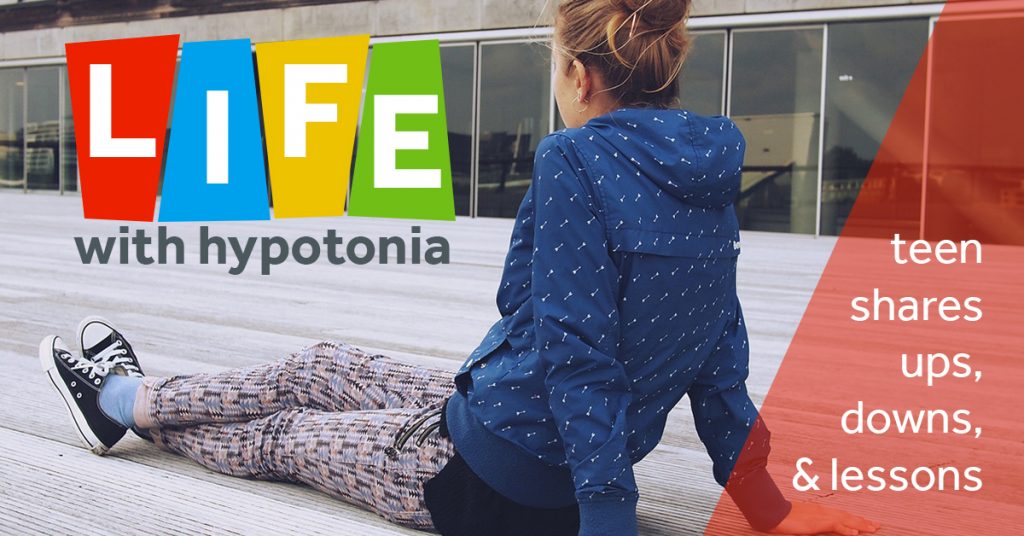9
Feb
2017
life with hypotonia – teen shares ups, downs & lessons

In many ways, Elizabeth is just like other high school students. She sings. Reads. Writes.
She also has hypotonia.
And she’s not passive about the diagnosis. Elizabeth actively raises awareness by blogging, talking, and posting on social media. If she has anything to say about it, the word hypotonia won’t always have to be followed by its definition.
We talked to Elizabeth to hear about her experiences and to provide perspective for parents who may be worried about their own child’s future.
How old where when you were diagnosed with hypotonia? What happened after that?
I was 5 when I was diagnosed with hypotonia. I was diagnosed at kindergarten registration. They were having us do some tasks to make sure there was nothing wrong with us, and I was diagnosed then. After that I immediately started physical therapy and the school provided physical therapy, and they started occupational therapy, too, to help with fine motor skills. I also went to an orthopedist to make sure there was nothing wrong with my feet.
What are some of the biggest obstacles you faced early in life because of hypotonia?
I was just never up to the same level as other kids. When they could be skipping and stuff like that, I could barely stand on one leg. When other kids could write neatly, my handwriting was incoherent scribble and teachers really didn’t understand that and they’d get frustrated at me and give me bad grades. I’d also get bullied by a lot of the other children because I would get pulled out of class for physical therapy and when the physical therapist came up, she said I had to go to PT and a lot of other kids teased me about potty training.
How does hypotonia effect you today?
It really effects mainly my school work in English especially because I have a hard time writing anything longer than maybe a five or six sentence paragraph and so I have to type it, but teachers aren’t always the keenest on giving me my IEP accommodations. Also, another big frustration is gym class. I could either be in a special ed. gym class or a regular gym class, but I’m stuck in the middle because the special ed. gym class would be like kids in wheelchairs, and school doesn’t think I need to be in that class. But in a normal gym class I can’t keep up with everyone else, which is frustrating for me, the other kids, and the gym teacher, but luckily the gym teacher has been especially understanding this year.
Another big obstacle in school is that I have a hard time getting to some of my classes on time because I’m a lot slower than other kids especially on stairs. I have no two classes that are on the same floor next to each other. My school is a three floor building, so navigating up and down stairs and across the building is frustrating.
What are the biggest lessons having hypotonia has taught you?
It’s taught me to learn who your friends are. Your friends are the people who help you research. Your friends are the people who stick up for you. Your friends are the ones who want to help you out when you’re a bit slower.
Another thing I learned, from personal experience, is never to assume things about other people because hypotonia is an invisible disability. People have assumed I’m lazy because I need to type. So I’ve just learned that you never know what people are going through.
What would say to parents of kids with hypotonia who are worried about the future?
Don’t worry too far into the future, just focus on the now. Don’t even worry about the big milestones. Just focus on the inchstones.
On the academic side of things, if you need to type instead of write or if you need anything kind of assistance with anything it’s ok. It’s what you need to succeed. Everyone needs different things to succeed. Everyone is different in their own way.
Why is raising awareness of hypotonia important to you?
For many reasons. One of the big reasons is hypotonia is SO under researched. They don’t even know how many people in the world have hypotonia, which is extremely frustrating.
Also, people with hypotonia deserve respect. We deserve acknowledgement. People with autism have autism awareness month. People with breast cancer have breast cancer awareness, but hypotonia has nothing. We slip through the cracks. We feel kind of forgotten. Raising awareness also raises acceptance, which means there are less teachers saying, “No, you can’t use your IEP accommodations,” and less people saying, “You’re lazy. Why are you lagging behind? What’s wrong with you?”
Thanks Elizabeth. Keep on doing what you’re doing.
Which Surestep product is right for your child?